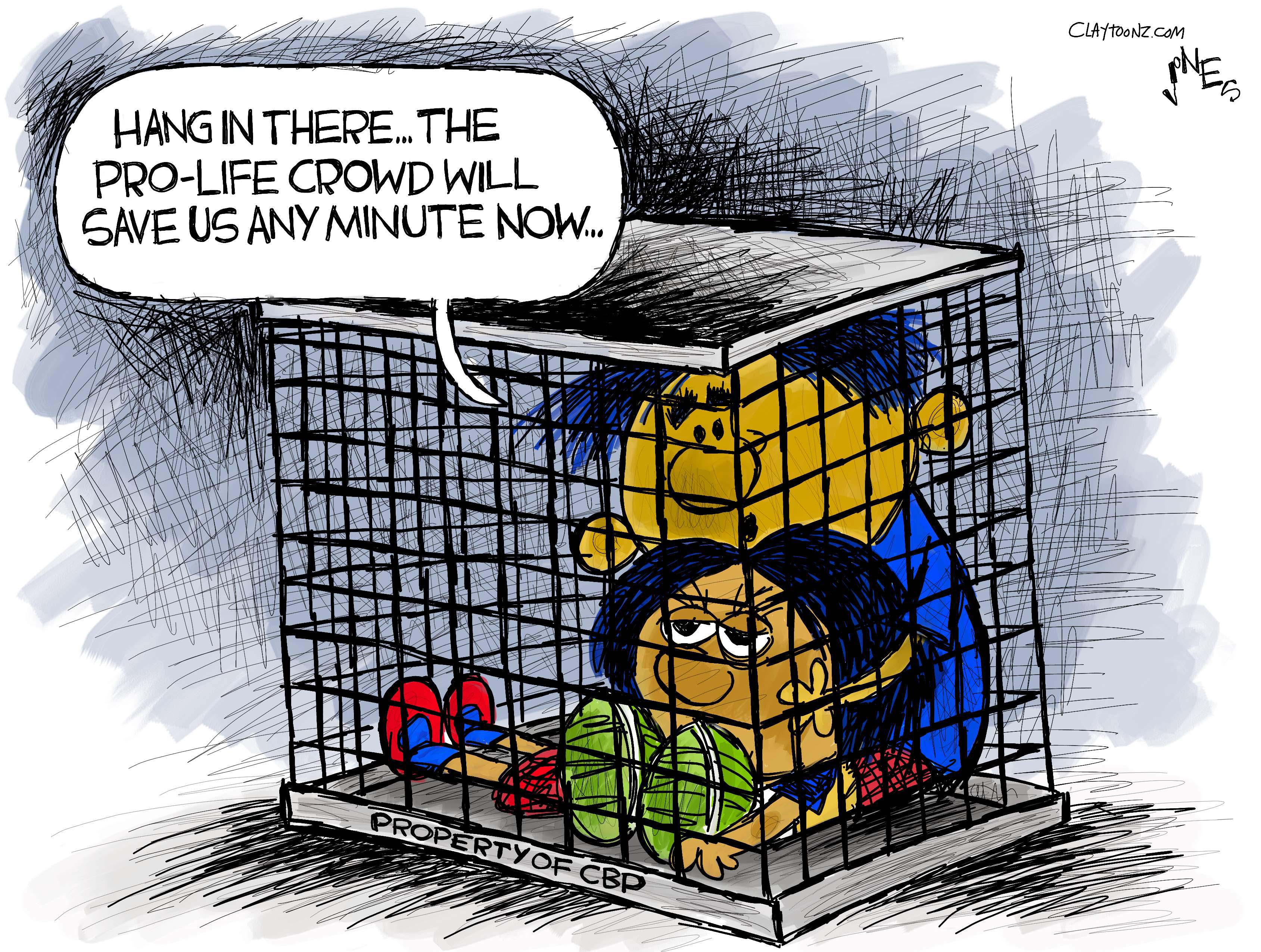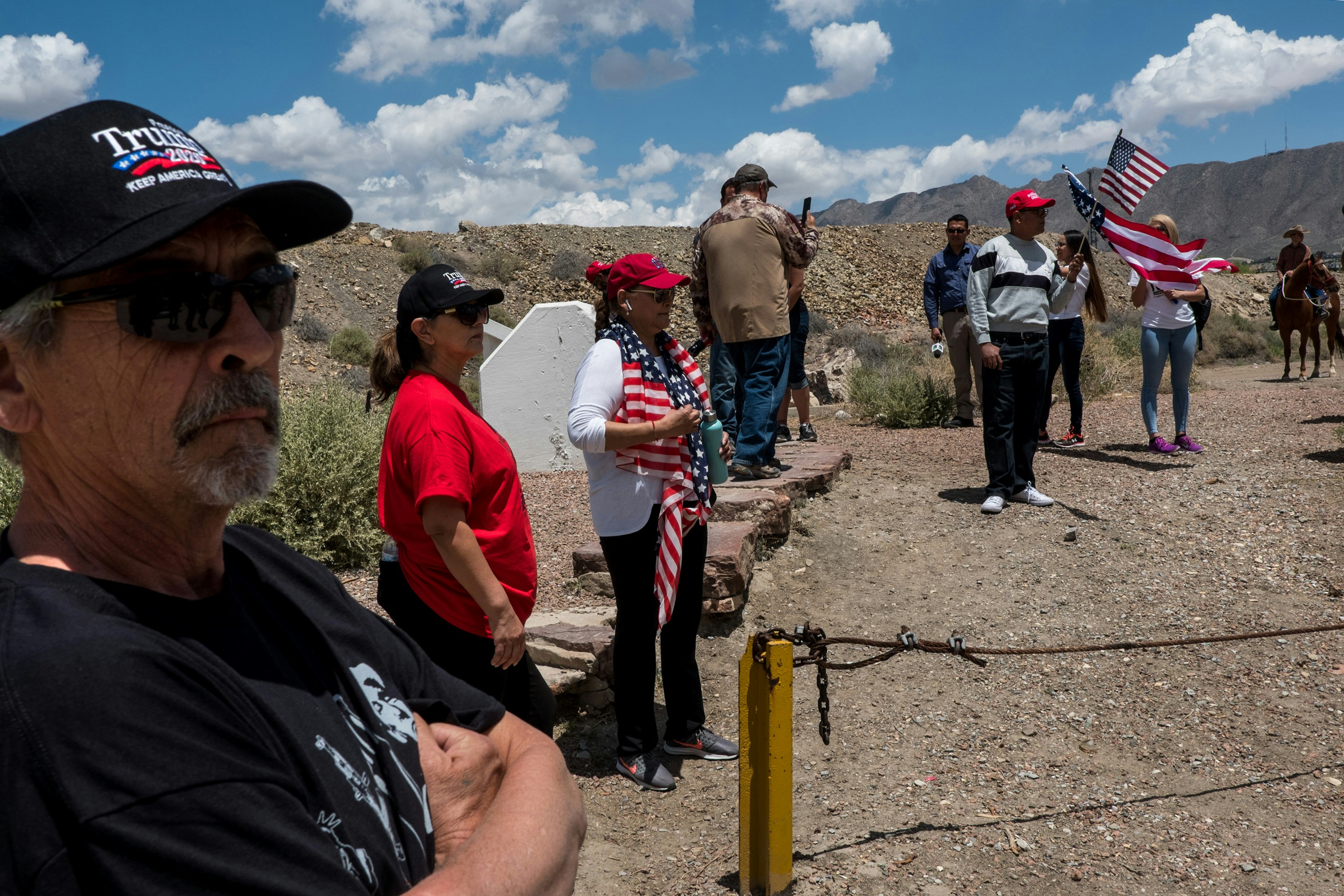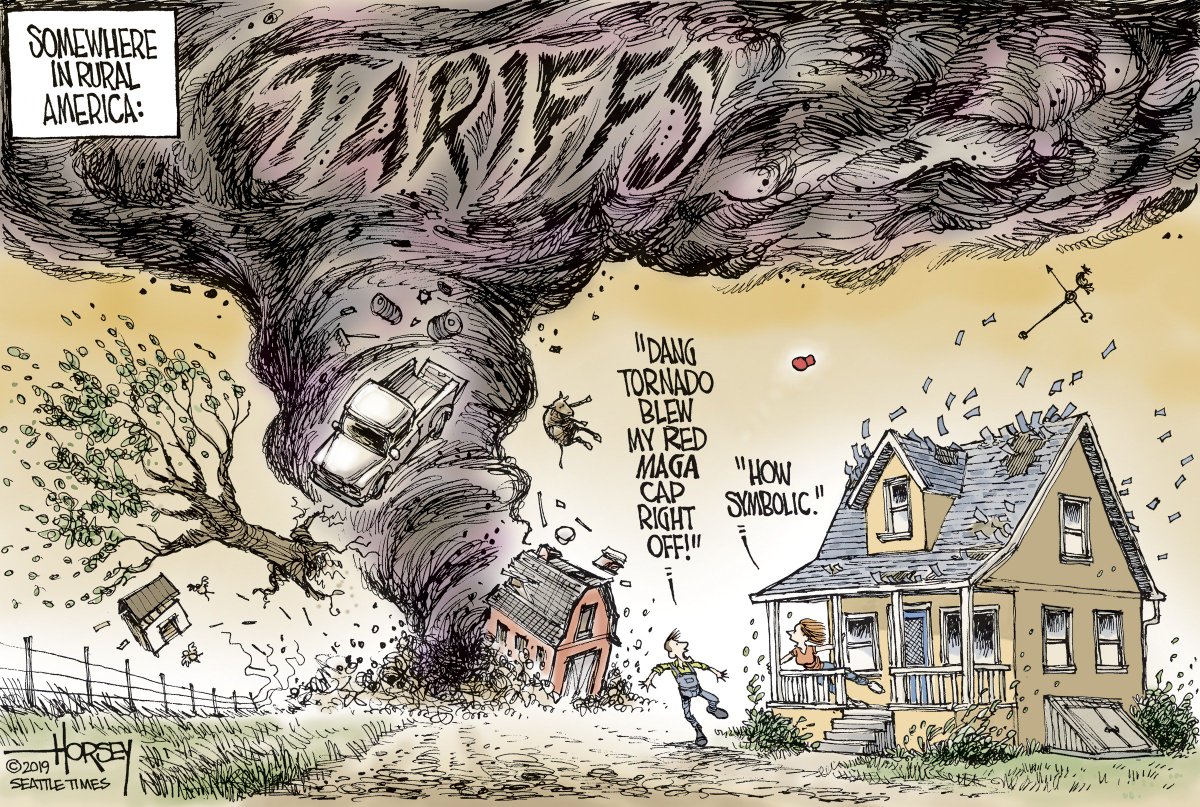Mike Lux, Crooks and Liars:
“Electability” is the hottest word of the moment, on every Democrat’s mind for sure. ... (The Democatic Party) is united around one thing and one thing only: beating Donald Trump. ...
But there are lots of myths about electability, and Democrats need to separate the myths from the facts to make a rational decision about who to support. Various candidates' strategies represent far more than one sensible school of thought about the best pathway to electability. Biden personifies the comfortable-as-an-old-shoe theory; Cory and Kamala's aim is to maximize the people of color vote; Bernie's focus is maximizing the youth vote and progressive energy (and minimizing the protest vote); Beto and Buttigieg are the fresh face/opposite of Trump candidates; Elizabeth Warren is running the "big ideas" campaign; and Inslee is prioritizing a bold transformation to a green economy. I’m not going to go over all those theories in detail because a lot of other people have done that and you probably already have a sense of what they are, but suffice to say they all have both some logic and some decent numerical analysis to back them up.
What I want to do instead is tell you some of the most important things you should know about the whole electability topic:
1. The conventional wisdom is almost always wrong. That conventional wisdom about who the most electable candidate was over the last several open cycles -- Hillary in 2016, Hillary in 2008, Kerry in 2004, Gore in 2000 -- has not tended to turn out well ... and the conventional wisdom about who could never win -- Trump in 2016, a black man with an African-Muslim name in 2008, Bill Clinton after his womanizing, draft dodging, and not inhaling problems in the 1992 primary -- have generally proven to be false as well.
2. Most of the time, the early frontrunner in the polls loses. At this time in (their respective) election cycle, the following candidates were the overwhelming favorite in the polling: LBJ in ’68, Muskie in ’72, Teddy Kennedy in ’76 and ’80, Mondale in ’84, Gary Hart in ’88, Mario Cuomo in ’92, Gore in 2000, Hillary in 2004, 2008, and 2016. Only 3 times in all those elections did the early frontrunner win, and 2 of those 3 times (Mondale and Hillary in 2016), they had a far tougher fight than expected. I will also note that most of the candidates who did beat those frontrunners were at about 1% about now in the national polls. Early polling matters less than anything I know of in presidential politics.
3. No one is doomed to lose the general election, and no one is sure to win. Democrats, especially this cycle, tend to get themselves 100% focused on the electability thing, and quickly convince themselves that their preferred candidate and path to victory is the only one that wins the general, and therefore other candidates have no chance. This is simply not borne out by any polling, historical measures, or other sensible analysis. Take a look at 2016: she would have won PA, MI, and WI (and thus the presidency) if there was a higher level of African-American turnout; or if she had won most of the Jill Stein voters; or if she had gotten a higher percentage in small towns and rural areas; or if more Bernie voters had turned out to vote; or if a higher percentage of young women voters had turned out to vote. Hillary all by herself had several different paths to victory demographically, not to even mention message-wise.
Keep in mind as well that diametrically opposed kinds of Democratic candidates (older white male conservatives as opposed to young black progressives) in both Georgia and Florida last year won almost identical numbers of votes. One can make the case that at least in some regions, partisan voting patterns are so aligned that all the hullabaloo over exactly what kinds of candidates to pick is a little overblown.
The fact is that Democrats have several different ways (to win) this race, and are in fact capable of electing a candidate who is capable of winning in a lot of different states. In addition to those 3 Rust Belt states mentioned above, Democrats are right on the cusp of winning NC, GA, FL, and AZ. Texas might even be in play depending on who the nominee turns out to be. If Sherrod Brown were on the ticket, maybe Ohio would come back into play. If Bernie is the nominee, maybe we lose some higher income older suburbanites who are scared of the word 'socialist', but we make that up with a big surge of young voters and/or people of color, combined with the Jill Stein voters who voted for Bernie.
At the same time, nothing is a sure thing. Even the supposedly safest candidates make mistakes, and those safe candidates may not turn out young folks or people of color (see Hillary Clinton).
Whoever our nominee is, we should go into this election assuming very little, neither over-confident nor despairing, because both can be fatal.
My advice to all of you Democrats who care about beating Trump is to ignore the conventional wisdom. Instead pick the candidate you think has the most compelling narrative and message, is the best at telling stories and building a strong positive identity that can withstand brutal attacks, is running most strongly on kitchen table issues, and who seems to be the most successful at getting the young people you know interested and excited. At the end of the day, these are the things that are going to matter the most in beating Trump.
And with that blogged, let's take a look at the candidates' climate report cards.
Greenpeace ranked the presidential candidates on their plans to fight climate change: @JayInslee A-@BernieSanders B+@CoryBooker B+@SenGillibrand B@ewarren B@BetoORourke B-@PeteButtigieg C@KamalaHarris C-@JoeBiden D-@realDonaldTrump Fhttps://t.co/Vm4NGaGxDy— Ari Natter (@AriNatter) May 30, 2019
And the latest on the first debate, coming up in a short four weeks.
The first 2020 Democratic primary debate, aired on NBC and MSNBC, will be held over 2 nights on June 26 and June 27, 2019. The debate will feature back-to-back evening broadcasts on consecutive nights to ensure each candidate gets access to a primetime audience.
So far, 19 candidates have qualified:
Biden, Booker, Bullock, Buttigieg, Castro, Delaney, Gabbard, Gillibrand, Harris, Hickenlooper, Inslee, Klobuchar, O’Rourke, Ryan, Sanders, Swalwell, Warren, Williamson, Yang
Learn more about each candidate on our 2020 candidate list. Candidates will have until late June to meet the qualifications needed to attend the first debate.
And since I can't report any shift in my top five ranking again this week, let's be liberal and add back some of the second- and third-tier candidates' activity over the past seven days. In alphabetical order:
Michael Bennet
The senator from Colorado faces uncertainty on whether he will qualify for the first debate in June. He has yet to reach the 65,000-donor threshold and still needs to crack one percent in another qualifying poll in the next month. He stated this past week, however, that he will keep going even if he does not qualify for the first debate and will hold out until the Iowa caucuses and New Hampshire primary next year.
This weekend, he is making his first stop in South Carolina since launching his presidential bid.
Democratic presidential candidate Michael Bennet criticizes President Trump over planned Mexico tariffs https://t.co/C84OexpHyB #CNNTownHall pic.twitter.com/fDoy1W5mCO— CNN Politics (@CNNPolitics) May 31, 2019
Joe Biden
Biden released the first major plank of his platform this week on public education. His proposal would boost federal funding for low-income school districts, increase teacher pay, make preschool universal, and increase investment on mental health services for K-12 students.
This happened here in town, and Grampa Joe drew consternation once more for his hands-on attention paid to an underage female audience member. (Go to that link for more Tweets, video, etc.)
In a somewhat odd moment at tonight's AFT town hall, Biden tells a 10-year-old girl, “I’ll bet you’re as bright as you are good-looking." He takes her over to the assembled reporters, then stands behind her and puts his hands on her shoulders while he's talking.— Felicia Sonmez (@feliciasonmez) May 28, 2019
Biden will also make his second campaign trip to Iowa on June 11th -- the same day Trump is scheduled to visit the state for a fundraiser.
Is Biden's Bounce Over?
Cory Booker
Booker called for impeachment proceedings against Trump for the first time following Mueller’s public statement on Wednesday.
“Robert Mueller’s statement makes it clear,” Booker tweeted. “Congress has a legal and moral obligation to begin impeachment proceedings immediately.”
The senator has previously expressed hesitation in calling for impeachment, even as other Democratic presidential contenders approved of such a step. This week, Booker also made his third trip to Nevada to appeal to swing voters.
Steve Bullock
The Montana governor who declared his candidacy earlier this month is working to catch up to other campaigns, especially in Iowa. This past week, Bullock hired ten more staffers in the first-in-the-nation caucus state to help build grassroots support.
Pete Buttigieg
On ABC’s This Week, Buttigieg told Martha Raddatz that “there is no question” that the president used bone spurs as an excuse to avoid service.
“I think to any reasonable observer that the president found a way to falsify a disabled status, taking advantage of his privileged status in order to avoid serving,” he said.
Buttigieg also criticized Trump for meeting with Kim Jong Un, saying it gave the North Korean government “legitimacy.” “The way diplomacy works, the way deals work, is you give someone something in return for something … it hasn’t worked at all,” he said.
On the topic of impeachment, Buttigieg moved closer to calling for it than he had previously, tweeting, “This is as close to an impeachment referral as it gets. Robert Mueller could not clear the president, nor could he charge him -- so he has handed the matter to Congress, which alone can act to deliver due process and accountability.”
Julian Castro
Last Thursday, Castro pledged to refuse contributions from oil, gas, and coal industry executives, tweeting, “Since day one, my campaign refused contributions from PACs, corporations, and lobbyists. Today I announced we’re also refusing contributions from oil, gas, and coal executives -- so you know my priorities are with the health of our families, climate and democracy.”
The former Secretary of Housing and Urban Development is also set to participate in a Fox News town hall on June 13. Many Democratic presidential contenders have wrestled with the decision to participate in events hosted by the news network, but Castro will be the fifth to do so.
Bill de Blasio
During CNN’s State of the Union this past week, de Blasio said that Biden’s 1994 crime bill was a “huge mistake” citing a “mass incarceration crisis” in the country.
“That crime bill was one of the foundations of mass incarceration in a very painful era in our nation’s history,” said de Blasio. “The (former) vice president and anyone else has to be accountable for every vote they take and what’s on their record, and I think that was a huge mistake.”
De Blasio also said that he understands Trump’s tricks and strategies better than other Democratic candidates and can “get under his skin.”
“I know something about Donald Trump that’s different from the other candidates because I watched him for decades.”
John Delaney
Delaney has been in the race longer than any other Democrat running for president and has been to Iowa far more times than any other contender. He has made the cut to participate in the first debate, having met the polling threshold, but he has not met the 65,000 donor threshold. This could complicate his chances to participate if more than 20 candidates qualify as candidates who meet both thresholds (will have their spots secured first).
On ABC News’ The Briefing Room, he declared that the debates are “really important” to his campaign’s ability to gain traction and blasted “the crazy DNC methodologies” which might keep him off the debate stage.
Delaney also released a $2 trillion infrastructure plan that would create seven new infrastructure funds and increase the size of the Highway Trust Fund.
Tulsi Gabbard
Earlier this week, Gabbard, who served in the medical unit of the Hawaii Army National Guard, criticized some politicians who she said, in a statement to ABC News, exploit the real meaning of Memorial Day.
“So nothing angers me more than the hypocrisy exhibited every Memorial Day by warmongering politicians and media pundits feigning sympathy for those who paid the ultimate price in service to our country, while simultaneously advocating for more counterproductive regime change wars and the new Cold War and arms race,” she said.
The Hawaii congresswoman has made foreign policy a centerpiece of her agenda, highlighting her credentials as a veteran. She also recently signaled during an interview with Fox News that she would reverse course with the Trump administration on the Iran nuclear deal, and re-enter the agreement if elected to the White House.
Gabbard heads to the West Coast this weekend for the California Democratic Party convention, among other events across the state.
In a week when Bob Mueller finally broke his silence, Trump reacted in typically neurotic fashion, the questions swirling around "to impeach or not" seemed to gain intensity, and with the recent news about Julian Assange's declining health and Reality Winner's media blockade, it's important to be reminded that Gabbard publicly declared two weeks ago that she would drop the charges against Assange and pardon Edward Snowden (to my standing ovation).
Kirsten Gillibrand
Mueller’s public statement Wednesday moved Gillibrand to explicitly support steps to remove the president.
“It’s time for Republicans and Democrats to begin impeachment hearings and follow the facts wherever they may lead,” she said in a statement. “We cannot let this president defy basic accountability measures built into our Constitution.”
In an early and significant show of support in the first-in-the-nation primary state, the New York senator also landed her first New Hampshire endorsement this week, from state Rep. Sue Ford, who said she’s “the best person” for the White House.
Kamala Harris
Earlier in the week, Harris stopped by Wofford College in South Carolina for an MSNBC town hall to outline her plan to confront the spate of anti-abortion laws sweeping across the country.
Sen. Harris: "I am going to put in place and require that states that have a history of passing legislation that is designed to ... limit a women's access to reproductive health care, that those laws have to come before my Department of Justice for a review and approval." pic.twitter.com/Fi3bVbk0La— MSNBC (@MSNBC) May 29, 2019
“Are we going to go back to the days of back-alley abortions? Women died before we had Roe v. Wade in place. On this issue, I’m kinda done,” she said. Harris is one of several co-sponsors of the Women’s Health Protection Act, a bill currently stalled in the Senate, but if passed, would vet laws passed to restrict access to abortion services.
Harris also joined Booker and Gillibrand in calling for impeachment, tweeting, “Now it is up to Congress to hold this president accountable. We need to start impeachment proceedings. It’s our constitutional obligation.”
Harris returns to her home state this weekend for the California Democratic Party convention and the MoveOn Big Ideas Forum.
Join us on June 1st for the first-ever #BigIdeas Forum w/ @CoryBooker @JulianCastro @SenGillibrand @KamalaHarris @AmyKlobuchar @BetoORourke @BernieSanders @ewarren! RSVP: https://t.co/Hb8Tcuo1ZP pic.twitter.com/CouyoTVdan— MoveOn (@MoveOn) May 31, 2019
John Hickenlooper
Amid the wave of states like Alabama, Georgia and Missouri passing highly-restrictive anti-abortion laws, Hickenlooper unveiled a new proposal to “protect the reproductive rights” of women by proposing a federal expansion of long-acting reversible contraception.
“I think that it’s a fundamental inalienable right that women should have control over their own bodies,” Hickenlooper told MSNBC of his newly-announced plan. “What’s going on in Indiana and even Missouri now, I mean so many states, is horrific.”
On Thursday morning, Hickenlooper echoed the newest slate of 2020 candidates in calling for impeachment proceedings, telling CNN, “After listening to Mueller, and I wanted to hear what he had to say, I think of myself as an extreme moderate. But I think he laid the responsibility clearly at the doorstep of Congress.”
“I think we have to begin an impeachment inquiry,” he said.
Former Colorado Governor And 2020 Candidate Urges Distance From 'Socialism'
Jay Inslee
Inslee announced this week he crossed the 65,000 donor mark, virtually ensuring himself a spot on the debate stage next month, making him one of a dozen candidates to qualify for the first debate based on both the DNC’s polling and fundraising criteria.
At a campaign stop in Nevada, the Washington governor endorsed Marie Newman, a progressive Democrat who is staging a primary challenge in the Illinois 3rd to oust one of the few pro-life Democrats still left in Congress. Inslee joins Gillibrand as the only other 2020 Democratic candidate to weigh in on the race. Gillibrand endorsed Newman back in April.
Inslee is also set to address the California Democratic Party State Convention in San Francisco this weekend.
Amy Klobuchar
At a campaign stop in Iowa over the weekend, Klobuchar recounted to a crowd the day of Trump’s “dark inauguration,” sitting between Sen. Bernie Sanders and the late Sen. John McCain.
“John McCain kept reciting to me names of dictators during that speech because he knew more than any of us what we were facing as a nation,” Klobuchar she said. “He understood it. He knew because he knew this man more than any of us did,” she added.
This prompted a response from McCain’s daughter, Meghan McCain, who asked Klobuchar to leave her “father’s legacy and memory out of presidential politics.”
Wayne Messam
Messam reiterated his call for impeachment on Wednesday, writing in a tweet, “Congress must now do its job of oversight and do what Mueller wasn’t allowed to.”
Seth Moulton
Moulton, a former Marine Corps officer, disclosed this week that he struggled with post-traumatic stress disorder after returning home from Iraq in 2008 -- as he announced a new plan to expand military mental health services for active-duty military and veterans.
“I had some particular experiences or regrets from the war that I just thought about every day, and occasionally I’d have bad dreams or wake up in a cold sweat,” Moulton told Politico in an interview.” He added that, “But because these experiences weren’t debilitating … it took me a while to appreciate that I was dealing with post-traumatic stress and I was dealing with an experience that a lot of other veterans have.”
Moulton unveiled his plan as part of a “Veterans Mental Health Tour” Tuesday night in Massachusetts and will continue his tour in Nevada this weekend.
Moulton, Tim Ryan, and Eric Swalwell all get a CNN town hall hour this Sunday evening. Just don't call it the "White Bread NeoLib Power Three Hours".
Beto O’Rourke
The former Texas congressman rolled out a sweeping immigration policy proposal this week that would among other things, establish a pathway to citizenship for the roughly 11 million undocumented people living in the U.S., invest $5 billion in foreign aid to “Northern Triangle” countries in Central America, and increase the number of immigration lawyers at the southern border.
“The current administration has chosen to defy this American aspiration, drafted into our Declaration of Independence, welded into the welcome of our Statue of Liberty, and secured by the sacrifices of countless generation,” a memo from the campaign read.
“Instead, the current administration is pursuing cruel and cynical policies that aim to sow needless chaos and confusion at our borders.”
Tim Ryan
Ryan tiptoed closer to calling for impeachment proceedings, without explicitly calling on Congress to open an inquiry.
“The President, no President, is above the law,” Ryan wrote on Twitter. “And it’s Congress’ job to make sure we are true to our founding principle that the President is not a King and must answer to the American people.”
Bernie Sanders
Before a series of negative headlines about the progressive senator’s second attempt to capture the presidency emerged, Sanders returned to his home state of Vermont earlier this week for a rally in Montpelier, and went on the offense, turning his attention to taking on Trump.
“The underlying principles of our government will not be racism, will not be sexism, will not be xenophobia and will not be religious bigotry -- and all the other mean-spirited beliefs of the Trump administration,” a fired-up Sanders told the crowd.
Sanders’s campaign also took on Biden in emails to supporters. Sanders’s campaign manager Faiz Shakir had previously attacked the Biden campaign for their “high-dollar” fundraisers but now, he’s once again criticizing the former vice president’s fundraising efforts.
“These are not grassroots fundraising events. These are high-dollar functions hosted and attended by corporate lobbyists, health care executives, a Republican casino-CEO, and a union-busting lawyer among others,” the email reads. “We can win elections without begging those people for money. And, indeed, we are more likely to win with a candidate who does not.”
Last night in Nevada, Bernie rolled out his comprehensive immigration reform plan.
RT BernieSanders: We have to end the dehumanization of undocumented people. That means:— 🌹 #BernieSanders for President 2020🌹 (@WeLoveBernie20) May 31, 2019
☑️a fully funded immigration adjudication system
☑️ending mass immigration raids
☑️not holding asylum seekers in detention while applications are processed
☑️ending … pic.twitter.com/gRThPbQg5c
Eric Swalwell
Swalwell stated that as a white man, he understands when to promote the voices of others.
In a video interview with Vice News, Swalwell stated, “A white guy who doesn’t see other identities or understand other experiences should not be president.”
“I do,” Swalwell continued. “And where there would be gaps in my knowledge or my experience, I will pass the mic to people who do have that experience.”
And after Mueller’s public statement Wednesday, Swalwell told MSNBC that he warned other House members to be prepared for impeachment proceedings, without explicitly calling for the start of a probe.
“‘Prepare for impeachment.’ That’s what I’ve told my colleagues,” he said.
Elizabeth Warren
Asked if she believed Mueller might be convinced to testify before Congress or be drawn to speak out against comments from the president this morning, Warren said on ABC’s The View Thursday that she didn’t take Mueller for someone who would act on impulse.
“I think Mueller’s got a slow pulse. He knows what he’s doing. I don’t think rage is how he rolls,” she told the co-hosts. “I think he’s one of those people who says read the footnotes.” Warren added that she thought this wasn’t about politics for Mueller, saying, “It’s about the Constitution. It’s not only about this president, but it’s about what are the rules for the next president and the next president?”
The Massachusetts senator has also not shied away from her policy to break up big tech companies ahead of her visit to the Bay Area this weekend for the California Democratic Convention, which will take place, of course, on many of the nation’s most powerful tech companies’ home turf. On Thursday, Warren unveiled a billboard that her campaign put up in San Francisco. It says “BREAK UP BIG TECH” next to a photo of her.
Andrew Yang
On Tuesday, Yang signed a pledge to end the “Forever War,” which calls for the end of continued American involvement in military conflicts overseas in places like Afghanistan and Iraq.
“We’ve continued in a constant state of war for the last seventeen years, and it has cost us tremendously in American lives as well as billions of dollars that could have been used to help families here at home,” Yang said in a statement.
The tech entrepreneur joined fellow 2020 hopefuls Sens. Warren and Sanders, and former Sen. Mike Gravel in signing onto the pledge.
=======================
Allllllllllrighty then. There's some fresh third-party news to report:
Howie Hawkins makes exploratory campaign official, will run for Presidentas Green Party's nominee in 2020
Releases Budget for an EcoSocialist Green New Deal
Howie Hawkins announced in Brooklyn today that he is seeking the Green Party nomination for president.
The centerpiece of Hawkins’ campaign for president is an ecosocialist Green New Deal. He is calling upon the nation to declare a climate emergency and mobilize a crash program to convert the economy to 100% clean renewable energy with zero greenhouse gas emissions by 2030. He said that will require social ownership and democratic planning of key sectors, including energy and railroads.
Hawkins’ announcement comes on the heels of a surge in votes for Green parties in the elections for European Parliament over the weekend. “The European Greens campaigned for a Green New Deal of climate action, social protections, and strengthened democracy. The Green New Deal is the program of hope that we can rally around to beat the ultra-right’s program of fear based on racism, xenophobia, religious bigotry, fact-free irrationalism, and authoritarianism. It’s how we beat the politics of Trumpism,” Hawkins said.
During his announcement, Hawkins released a blueprint and budget for an ecosocialist Green New Deal that he intends to advance as the standard against which the presidential campaign debate on the Green New Deal should be measured.
The budget covers a broad range of economic and environmental policies and programs, with their costs, the jobs created, and the sources of funding. The bottom line numbers show nearly 23 million new jobs created, including nearly 6 million manufacturing jobs, by investing about $2 trillion a year in reconstructing the energy and other productive systems for ecological sustainability over the next 20 years. A multi-layered web presentation of the budget that provides documentation and background information is on Hawkins’ campaign website at howiehawkins.us.
Gadfly with a bit. Since the Greens will be on the ballot in Deep In the Hearta -- unless Greg Abbott vetoes the bill, that is -- there will be a progressive option at the top of the ticket if Bernie, by some cruel quirk of fate,
Last but by no means least, this indy candidate intrigues.
Running to educate! @wirelesshogan Best POTUS 2020 Campaign video thus far. https://t.co/53Cmp3fCU1 #NativePerspective #MakeColonistsUncomfortable #Diné— Jacqueline Keeler (@jfkeeler) May 29, 2019
That's all for this week!






























:format(webp)/cdn.vox-cdn.com/uploads/chorus_image/image/63844692/PRIMARIES_DEM_FRONT_MAY6.0.png)